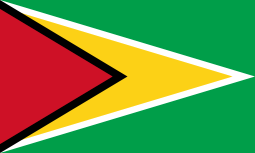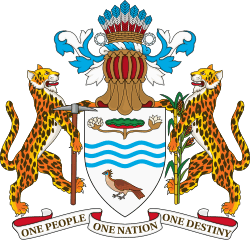Guyana (1966–1970)
Guyana was a predecessor to the modern-day Republic of Guyana and an independent state that existed between 1966 and 1970.
Guyana | |||||||||
|---|---|---|---|---|---|---|---|---|---|
| 1966–1970 | |||||||||
Motto: "One people, one nation, one destiny" | |||||||||
.svg.png) | |||||||||
| Capital | Georgetown | ||||||||
| Government | Constitutional monarchy | ||||||||
| Queen | |||||||||
• 1966–1970 | Elizabeth II | ||||||||
| Governor-General | |||||||||
• 1966 | Richard Luyt | ||||||||
• 1966–1969 | David Rose | ||||||||
• 1969–1970 | Edward Luckhoo | ||||||||
| Prime Minister | |||||||||
• 1966–1970 | Forbes Burnham | ||||||||
| Historical era | Cold War | ||||||||
• Independence | 26 May 1966 | ||||||||
• Republic | 23 February 1970 | ||||||||
| Currency | Guyanese dollar | ||||||||
| ISO 3166 code | GY | ||||||||
| |||||||||
History
British rule ended on 26 May 1966 when Guyana was given independence from the United Kingdom by the Guyana Independence Act 1966,[1] which transformed British Guiana into an independent Commonwealth realm or dominion. Elizabeth II was Queen of Guyana; however, she did not reside in or visit Guyana during her reign as Queen of Guyana. The monarch's constitutional roles were mostly delegated to the Governor-General of Guyana. Forbes Burnham held office as prime minister (and head of government) of Guyana during this period.
The Republic of Guyana was formed on 23 February 1970 when Guyana became a republic in the Commonwealth.[2][3]
Following the abolition of the monarchy, former Governor-General Sir Edward Luckhoo provisionally became the first President of Guyana.
Governors-general
The following governors-general held office:
- Sir Richard Luyt (26 May 1966–16 December 1966)
- Sir David Rose (16 December 1966–10 November 1969)
- Sir Edward Luckhoo (10 November 1969–1 July 1970)
References
- "Guyana Independence Act 1966". Legislation.gov.uk. Retrieved 26 May 2013.
- "Guyana Republic Act 1970". Legislation.gov.uk. Retrieved 26 May 2013.
- "Guyana Republic Bill". TheyWorkForYou.com. Retrieved 26 May 2013.

